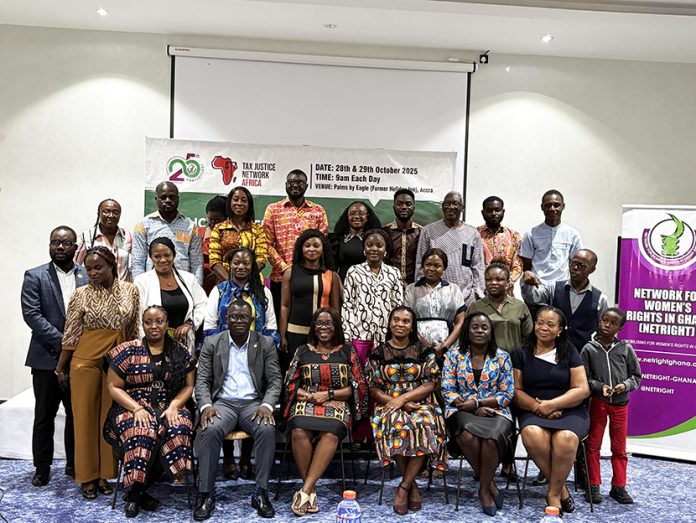The Network for Women’s Rights in Ghana (NETRIGHT), together with civil society organisations, women’s groups, trade unions, academia and development partners has called on government to implement urgent fiscal policy reforms that promote a fair, progressive and gender-equitable tax system, while taking decisive action to curb illicit financial flows (IFFs).
The call was made at the end of a two-day policy conference, held in Accra from October 28 to 29, 2025 on the theme: “Promoting Tax Justice and Curbing Illicit Financial Flows for Inclusive and Gender-Equitable Development in Ghana.”
In a communiqué issued at the end of the conference by the Head of Secretariat of NETRIGHT, Patricia Blankson Akakpo, participants emphasised that tax justice was the cornerstone of social justice and an essential tool for achieving Ghana’s development goals, including Sustainable Development Goals (SDGs) 1 (No Poverty), 5 (Gender Equality), 10 (Reduced Inequalities), 16 (Peace, Justice, and Strong Institutions), and 17 (Partnerships for the Goals).
Despite Ghana’s improved tax-to-GDP ratio of 16 percent in 2024, the group observed that revenue mobilisation remains insufficient to adequately fund public investments in health, education, and social protection. This challenge, they said, is worsened by illicit financial flows, tax avoidance, and profit-shifting by multinational companies, particularly in the mining, oil, and gas sectors.
“Ghana continues to lose an estimated US$1.4 billion annually through illicit commercial practices such as trade misinvoicing, profit-shifting, and tax avoidance.
“These outflows deprive the nation of resources that could have been invested in education, healthcare, and women’s economic empowerment,” the statement said.
The participants decried Ghana’s overreliance on indirect taxes, such as Value Added Tax (VAT), which disproportionately burden low-income households and women in the informal sector.
They stressed that a “gender-blind” tax system perpetuates inequality and undermines women’s economic opportunities.
“Women who dominate the informal economy face a double burden of taxation and unpaid care work. A gender-ignored tax system is by extension an unjust system,” the statement noted.
The conference called on government to:
- Implement progressive tax reforms ensuring that high-net-worth individuals and multinational corporations contribute their fair share.
- Reduce or remove taxes on essential goods and services such as menstrual hygiene products, maternal health, and childcare items.
- Institutionalise the anti-illicit financial flows policy tracker across key agencies, including the Ministry of Finance and Ghana Revenue Authority, to monitor and publish data on trade misinvoicing, tax evasion, and resource export leakages.
- Strengthen gender-responsive budgeting and conduct gender impact assessments for all major tax and fiscal policies.
- Enhance fiscal transparency by publishing accessible, comprehensive, and timely data on tax exemptions, incentives, and revenue utilisation.
- Support media partnerships and civic engagement to promote tax literacy and expose tax injustices and corruption.
Participants also urged Parliament, the Judiciary, and other oversight institutions to intensify accountability mechanisms and ensure that fiscal decisions are inclusive and rights-based.
NETRIGHT and its partners reaffirmed their commitment to advocating for gender-equitable tax justice, fiscal transparency, and accountability.
They pledged to build strategic alliances with women’s groups, media, and government agencies to ensure domestic resource mobilisation is fair, effective, and socially just.
“Tax justice is gender justice. A just and inclusive tax system is fundamental to national transformation, gender equality and poverty reduction. Curbing illicit financial flows and promoting progressive taxation will help Ghana build an inclusive economy that leaves no one behind,”the communiqué concluded
For more news, join The Chronicle Newspaper channel on WhatsApp: https://whatsapp.com/channel/0029VbBSs55E50UqNPvSOm2z









